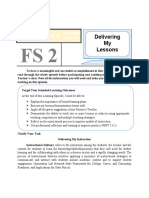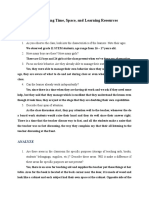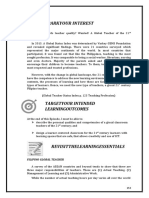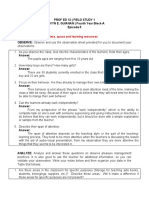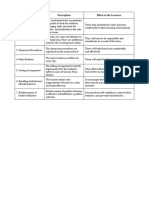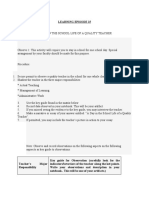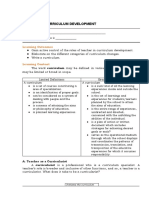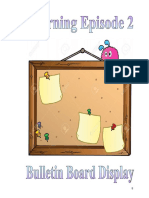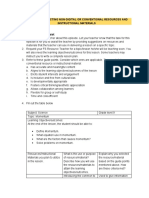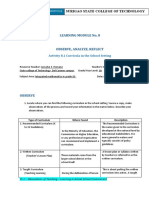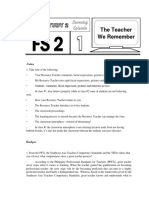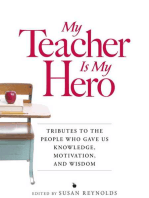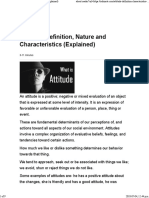Learning Episode 16 On Teachers Philosophy of Education
Learning Episode 16 On Teachers Philosophy of Education
Uploaded by
Karen Marie Dela PasionCopyright:
Available Formats
Learning Episode 16 On Teachers Philosophy of Education
Learning Episode 16 On Teachers Philosophy of Education
Uploaded by
Karen Marie Dela PasionOriginal Title
Copyright
Available Formats
Share this document
Did you find this document useful?
Is this content inappropriate?
Copyright:
Available Formats
Learning Episode 16 On Teachers Philosophy of Education
Learning Episode 16 On Teachers Philosophy of Education
Uploaded by
Karen Marie Dela PasionCopyright:
Available Formats
lOMoARcPSD|5530194
Learning Episode 16 On Teacher's Philosophy of Education
Facilitation Theory and Practice (Maryhill College)
Studocu is not sponsored or endorsed by any college or university
Downloaded by Karen Marie dela Pasion (karenmarie.delapasion@yahoo.com.ph)
lOMoARcPSD|5530194
LEARNING EPISODE 16 On Teacher’s Philosophy of Education
Activity 16.1 Analyzing DepEd’s Philosophy of Education
Philosophies of education Which philosophies are Which philosophies are expressed in
expressed in the DepEd the k to 12 curriculum framework and
vision, mission guide and sec 5 of RA 10533? Give
statements, core values, proof.
mandate? Give proof.
1. Essentialism - Essetialism - the core Essentialism - list of standards and
prescteach values of maka-diyos, competencies that learners are
mastery of the maka-tao, makakalikasan expected to attain is the subject matter
basics; curriculum and makabansa show that that student are expected to learn.
is prescribed; DepEd believes in - essentialist
subject matter - unchanging values that
centered there are need to be inculcated.
universal,
objectives values;
inculcate values in
subject matter
2. Perennialism - teach The Deped Mission, in In order to bring good values and
those that last, the which students learn in a characteristics to the K-12 Curriculum
classics; there are child-friendly, gender- Framework, students needed to
universal values; sensitive, safe, and acquire in-depth knowledge, skills,
inculcate the motivating environment, values, and attitudes through continuity
universal, objective demonstrates that DepEd and consistency across all levels and
values used Perennialism; it help subjects.
to be friendly and good
citizens of our country in
the future as they bring
good values that they
learned in school.
3. Progressivism - very The fact that the DepEd is Curriculum Development, The
child-centered; a learner-centered curriculum must be learner-centered,
teach those that institution that is inclusive, and developmentally
interest the child; constantly improving itself appropriate, demonstrating how
one learns by to better serve its Progressivism is used in this law.
experience; stakeholders
learners learn by demonstrates that the
doing so teacher DepEd is progressive.
teacher’s teaching DepEd believes that
is experiential; learners learn by doing as
values are well as by teaching about
subjective; no topics in which they are
inculcation of interested.
values since they
are subjective;
instead teachers
Downloaded by Karen Marie dela Pasion (karenmarie.delapasion@yahoo.com.ph)
lOMoARcPSD|5530194
help students
clarify their values.
4. Reconstructionism - The administrators and The Curriculum Relevant To Learners
school is agent of staffs, as stewards of the (Contextualization And Enhancement)
change; schooling institution, ensure an demonstrates that there is an
is preparing enabling and supportive application of Reconstructionism in
students for the environment for effective which the students discuss the issues.
social changes; learning to occur
teaching is demonstrates that DepEd
involving the is reconstructionism.
students in DepEd believes that
discussions of teaching is involving
moral dilemmas students in discussions of
moral quandaries in order
for them to understand the
consequences of their
actions.
5. Existentialism - Teachers facilitate learning It demonstrates that there is a proof of
teachers teach and constantly nurture Existentialism that can be used to allow
learners to make every learner in the DepEd students to choose a specialization
choice, to make mission, demonstrating based on aptitude, interests, and
decisions and not that DepEd is school capacity. The subjects a student
merely to follow the existentialism. DepEd will take in Grades 11 and 12 will be
crowd; one who believes that society determined by the career path he or
does not make should not limit an she chooses.
choice and so individual's life or actions
simply follow because such limitations
others do not leave inhibit free will and the
meaningful life development of that
person's potential.
6. Pragmatism -that The DepEd Vision, which The Curriculum Is Relevant To
which is useful, enables them to realize Learners, it also demonstrates the use
that which is their full potential and of Pragmatism as students acquire in-
practical and that meaningfully contribute to depth knowledge, skills, values, and
which works what the nation's building, attitudes through continuity and
is good; that which demonstrates that DepEd consistency in order to encourage them
is efficient and used Pragmatism because to grow into better people at all levels.
effective is that they believe that teaching
which is good e.g students things that are
showing a video practical for life
clip on mitosis is encourages them to grow
more efficient and into better people.
more effective and
therefore more
practical that
teacher coming up
with a visual aid by
Downloaded by Karen Marie dela Pasion (karenmarie.delapasion@yahoo.com.ph)
lOMoARcPSD|5530194
drawing mitosis on
a cartolina or
illustration board.
7. Rationalism - The DepEd Core Values of Curriculum Development is an example
emphasizes the Maka-Diyos, Maka-tao, of Rationalism in action, as the
development of the Makakalikasan, and curriculum must be relevant,
learners’ reasoning Makabansa are proof that responsive, and research-based, as
powers; knowledge DepEd practiced students learn through reason alone,
comes through Rationalism, in which they without the aid of the senses.
reason; teacher only believe what is based
must develop the on reason and provides
reasoning power of the primary basis for
the learner knowledge.
8. Utilitarianism - what We dream of Filipinos who Curriculum Development is an example
is good is that fervently love their country, of Utilitarianism in action, as the
which is most which demonstrates that curriculum must be culturally sensitive,
useful (that which DepEd also employs and the teacher approach provides no
brings happiness) Utilitarianism, which sense of what constitutes an education.
to the greatest advocates actions that
number of people; promote happiness or
pleasure while opposing
actions that cause
unhappiness or harm.
9. Empiricism - source Teachers facilitate learning Curriculum Development demonstrates
of knowledge is and constantly nurture the use of Empiricism in which the
through the each learner, curriculum shall use constructivist,
senses; teacher demonstrating that DepEd inquiry-based, reflective, collaborative,
must involve the employs Empiricism, in and integrative pedagogical
senses in teaching- which teaching-learning of approaches.
learning students is based on the
human senses, and in
which it shares the belief
that there is no such thing
as innate knowledge, and
that knowledge is instead
derived from experience.
10. Behaviorism - Students learning in a Curriculum Development demonstrates
behavior is shaped child-friendly, gender- that there is a Bahaviorism in which the
deliberately by sensitive, safe, and curriculum shall be learner-centered,
forces in the motivating environment is inclusive, and developmentally
environment and evidence that DepEd used appropriate; we teachers encourage
that the type of Behaviorism, in which the students to perform desired behavior
person and actions teacher provides positive by rewarding good performance.
desired can be the reinforcement, or rewards,
product of design; at the end of the day for
behavior is their good behavior.
determined by
Downloaded by Karen Marie dela Pasion (karenmarie.delapasion@yahoo.com.ph)
lOMoARcPSD|5530194
others, rather than
by person’s own
free will; teacher
must carefully
shape desirable
behavior; drill are
commonly used to
enhance learning.
Rewards reinforce
learning.
11. Constructivism Teachers facilitate learning It demonstrates the existence of
-learners are and constantly nurture Constructivism, which encourages
capable of each learner, students to consider sharing their
constructing demonstrating that DepEd valuable knowledge and experiences
knowledge and employs Constructivism by as learners.
meaning; teaching- assisting learners to
learning therefore construct knowledge
is constructing rather than passively
knowledge and taking in information.
meaning; teacher
does not just “tell”
or dictate but asks
learners for
knowledge they
construct and
meaning of lesson.
12. Other philosophies
Activity 16.2 Articulating My Personal Philosophy of Teaching
OBSERVE
Philosophies of education Teaching behavior state what the teacher said,
taught or did)
1. Essentialism - prescteach mastery In what way was teacher essentialist?
of the basics; curriculum is
prescribed; subject matter - E. g he/she saw it that the students mastered
centered there are universal, basic concepts and skills.
objectives values; inculcate values
in subject matter He/she included values.
2. Perennialism - teach those that last, The teacher ensures that her students can read,
the classics; there are universal write, communicate, and comprehend effectively.
values; inculcate the universal,
objective values
3. Progressivism - very child-centered; She provides icebreakers that highlight students'
teach those that interest the child; talents. Allow pupils to participate in extracurricular
one learns by experience; learners activities if they so desire.
Downloaded by Karen Marie dela Pasion (karenmarie.delapasion@yahoo.com.ph)
lOMoARcPSD|5530194
learn by doing so teacher teacher’s
teaching is experiential; values are
subjective; no inculcation of values
since they are subjective; instead
teachers help students clarify their
values.
4. Reconstructionism - school is agent The teacher ensures that students participate in
of change; schooling is preparing school drills such as fire and earthquake drills, and
students for the social changes; she allows her students to create action
teaching is involving the students in plans/essays based on real-life issues..
discussions of moral dilemmas
5. Existentialism - teachers teach The teacher asks student with HOTS questions. She
learners to make choice, to make let the students create their own salad and
decisions and not merely to follow appetizers.
the crowd; one who does not make
choice and so simply follow others
do not leave meaningful life
6. Pragmatism -that which is useful, She applies various strategies to determine which
that which is practical and that ones are most effective on teaching her students.
which works what is good; that She employs visuals that effectively capture the
which is efficient and effective is learners' attention.
that which is good e.g showing a
video clip on mitosis is more
efficient and more effective and
therefore more practical that
teacher coming up with a visual aid
by drawing mitosis on a cartolina or
illustration board.
7. Rationalism - emphasizes the She inquires about the students' thoughts on the
development of the learners’ topic at hand. She also encourages students to
reasoning powers; knowledge justify their responses.
comes through reason; teacher
must develop the reasoning power
of the learner
8. Utilitarianism - what is good is that
which is most useful (that which
brings happiness) to the greatest
Creates
number of people;
classroom
rules with the
involvement
Downloaded by Karen Marie dela Pasion (karenmarie.delapasion@yahoo.com.ph)
lOMoARcPSD|5530194
of his/her
lessons.
Select
classroom
officers by
voting and
selection of the
class
She creates classroom rules with the involvement of
his/her lessons. She assign classroom officers by
voting and selection of the class.
9. Empiricism - source of knowledge is She uses visual aids in delivering the lesson. Allows
through the senses; teacher must experimentation during actual presentation of
involve the senses in teaching- appetizers, salads and salad dressings.
learning
10. Behaviorism - behavior is shaped She creates classroom rules, gives verbal pauses to
deliberately by forces in the students, models good behavior and give
environment and that the type of reinforcement to students’ behaviors.
person and actions desired can be
the product of design; behavior is
determined by others, rather than
by person’s own free will; teacher
must carefully shape desirable
behavior; drill are commonly used
to enhance learning. Rewards
reinforce learning.
11. Constructivism -learners are Allow students to share their own experiences,
capable of constructing knowledge knowledge, and views while guiding them to the
and meaning; teaching-learning correct answer. Allow numerous responses in some
therefore is constructing knowledge situations/questions.
and meaning; teacher does not just
“tell” or dictate but asks learners for
knowledge they construct and
Downloaded by Karen Marie dela Pasion (karenmarie.delapasion@yahoo.com.ph)
lOMoARcPSD|5530194
meaning of lesson.
12. Other philosophies
ANALYZE
1. Based on your findings and observations in activity 16.1 and activity 16.2, which
philosophies of education are dominant in Philippine basic schools? Why do you say so?
Essentialism, perennialism, progressivism, existentialism and behaviorism.
These all 5 philosophies are the ones that been used over the years in Philippine
education since pre schooling up until college.
2. If there is one philosophy that schools and teachers should give more attention to, what
should that be and why?
Despite the fact that essentialism emphasizes teacher-centered learning, I
favor the essentialism philosophy of education because the content steadily progresses
to more complicated abilities and specific information. Essentialism aims to instill the
most basic academic information and abilities, as well as character development, in all
students.
REFLECT
My philosophy of Teaching
These may be of help: the learning progress of the students
I believe that the learner does not all learn in the same way or at the same rate. They have
their own differences towards the learning process and that should I have to respect and
understand.
I believe that I should teach the learners to construct and transform their own knowledge
through the application of their past experiences and prior learning.
By teaching and introducing what the real world is.
I believe that I have a responsibility as a teacher to be an effective diagnostician of students’
interests, abilities, and prior knowledge. I must then plan learning experiences that will both
challenge and allow every student to think and grow.
Downloaded by Karen Marie dela Pasion (karenmarie.delapasion@yahoo.com.ph)
You might also like
- SCMP Examination Prep ManualDocument23 pagesSCMP Examination Prep ManualPurnima Verma100% (1)
- Descartes' Discourse On Method, Part 4 (God)Document5 pagesDescartes' Discourse On Method, Part 4 (God)Asaad100% (1)
- Episode 16Document7 pagesEpisode 16Gene Lloyd Nacor100% (1)
- Episode 11Document12 pagesEpisode 11PRESIDENT GAMINGNo ratings yet
- Episode 5Document7 pagesEpisode 5Johairah M. PanontonganNo ratings yet
- FS1 Ep12Document4 pagesFS1 Ep12Margie Borja100% (1)
- Close Encounter With School Curriculum: Field Study 1Document11 pagesClose Encounter With School Curriculum: Field Study 1Pau TristeNo ratings yet
- EpisodeDocument27 pagesEpisodeSpinx Lumberspartie100% (1)
- Episode 15Document6 pagesEpisode 15Ma C KyNo ratings yet
- Marga Sendfs1 - 13Document37 pagesMarga Sendfs1 - 13Angelo BolanteNo ratings yet
- FS 1 Learning Episode 10Document9 pagesFS 1 Learning Episode 10rftuazon100% (1)
- Daryllfs1 1 2Document268 pagesDaryllfs1 1 2Angelica Cimini RecierdoNo ratings yet
- fs1 Episode 6Document6 pagesfs1 Episode 6Jamille Nympha C. BalasiNo ratings yet
- Episode 8 OARDocument8 pagesEpisode 8 OARFredie RamosNo ratings yet
- FIELD STUDY 1 Episode 11 13 FinalDocument76 pagesFIELD STUDY 1 Episode 11 13 FinalLors ArcaNo ratings yet
- Ep 15-fs 1Document11 pagesEp 15-fs 1Jeny MontillaNo ratings yet
- Learning Episode 10Document9 pagesLearning Episode 10Melvin SumalinogNo ratings yet
- Learning Episode 3 - Field Study 2Document4 pagesLearning Episode 3 - Field Study 2JUSTICENo ratings yet
- Prof Ed 12 - Episode 5Document6 pagesProf Ed 12 - Episode 5Apelacion L. VirgilynNo ratings yet
- FS1-Episode 3Document9 pagesFS1-Episode 3Angela MagallanesNo ratings yet
- Republic of The Philippines Jose Memorial State: The Premier University in Zamboanga Del NorteDocument169 pagesRepublic of The Philippines Jose Memorial State: The Premier University in Zamboanga Del NorteNosyap Nopitak IlahamNo ratings yet
- Learning Episode 5: Creating An Appropriate Learning EnvironmentDocument13 pagesLearning Episode 5: Creating An Appropriate Learning EnvironmentMarwin Rebollos ApolinarioNo ratings yet
- Fs 1 Episode 11Document20 pagesFs 1 Episode 11Bembem DelfinNo ratings yet
- Field Study 1: Toward Teacher Quality: Developing A Global Teacher of The 21 CenturyDocument15 pagesField Study 1: Toward Teacher Quality: Developing A Global Teacher of The 21 CenturyPau TristeNo ratings yet
- Classroom Management MatrixDocument1 pageClassroom Management MatrixLenard Justine Camacho100% (1)
- FS 1 - Episode 6Document5 pagesFS 1 - Episode 6Bhabierhose Saliwan LhacroNo ratings yet
- FS Le 15.Document7 pagesFS Le 15.Bon Ivan FirmezaNo ratings yet
- FS2 Episode 1Document7 pagesFS2 Episode 1Jeremy Bersano100% (1)
- FS 1 Ep. 3 DoneDocument15 pagesFS 1 Ep. 3 DoneRylNo ratings yet
- Fs1 Learning Episode 11 To 15Document28 pagesFs1 Learning Episode 11 To 15JoyShaira Delgado RojoNo ratings yet
- Episode 5Document8 pagesEpisode 5PRESIDENT GAMINGNo ratings yet
- FS1 - Episode 7 - Delos SantosDocument9 pagesFS1 - Episode 7 - Delos SantosLovely Delos Santos IINo ratings yet
- FS2 Le1Document5 pagesFS2 Le1Mayang AscañoNo ratings yet
- Prof Ed 13 - Episode 6Document3 pagesProf Ed 13 - Episode 6Jervyn GuiananNo ratings yet
- Learning Episode 6: Enhancing A Face-To-Face Learning EnvironmentDocument4 pagesLearning Episode 6: Enhancing A Face-To-Face Learning EnvironmentVincent Barugo ReofrioNo ratings yet
- Assessment OF Learning (Summative Assessment) : SPARK Your InterestDocument25 pagesAssessment OF Learning (Summative Assessment) : SPARK Your InterestChuck GarridoNo ratings yet
- Field Study 1 Le 14-16Document21 pagesField Study 1 Le 14-16Cherryl SiquigNo ratings yet
- Episode 3Document21 pagesEpisode 3Edlyn Mae CastroNo ratings yet
- Work Sheets Ep 10Document3 pagesWork Sheets Ep 10Zhea PahigdanaNo ratings yet
- Field StudyDocument4 pagesField StudyzharinaNo ratings yet
- Field Study 1 (Episode3)Document9 pagesField Study 1 (Episode3)Ms.BaeNo ratings yet
- Learning Episode 2Document9 pagesLearning Episode 2Jason RafalloNo ratings yet
- FS OneDocument24 pagesFS OneMae CordeneteNo ratings yet
- FS 1 Ep 15Document15 pagesFS 1 Ep 15Jonamae OcanNo ratings yet
- FS 1 Episode 10, 11Document17 pagesFS 1 Episode 10, 11Tyndale Faith Hagas CastillonNo ratings yet
- FIELD STUDY 1 Episode 6Document7 pagesFIELD STUDY 1 Episode 6RylNo ratings yet
- FS 1 Ep 10 - Field Study 1 Episode 10.: College of Education (Camarines Norte State College)Document26 pagesFS 1 Ep 10 - Field Study 1 Episode 10.: College of Education (Camarines Norte State College)Whenan Faith Oliveros PayoNo ratings yet
- Ep 14-fs1Document7 pagesEp 14-fs1Jeny MontillaNo ratings yet
- To SendDocument14 pagesTo SendJamille Nympha C. BalasiNo ratings yet
- Fs1 Module 10 GaliDocument4 pagesFs1 Module 10 GaliShanlaine GaliNo ratings yet
- Learning Episode 12Document12 pagesLearning Episode 12Melvin SumalinogNo ratings yet
- Learning Episode 3 (FS2)Document5 pagesLearning Episode 3 (FS2)Tobio KageyamaNo ratings yet
- Learning Episode 19. Writing An Initial Action Research PlanDocument7 pagesLearning Episode 19. Writing An Initial Action Research PlanmariovillartaNo ratings yet
- Espino, Raymark O - Module 8 (FS1)Document12 pagesEspino, Raymark O - Module 8 (FS1)markNo ratings yet
- FIELD STUDY 2 (Episode 2)Document5 pagesFIELD STUDY 2 (Episode 2)Jerico Padilla NuestroNo ratings yet
- FS 2 Learning EpisodesDocument73 pagesFS 2 Learning EpisodesChristian BeninNo ratings yet
- Episode 10Document8 pagesEpisode 10Noviegen CardenteNo ratings yet
- Module3 FS 1Document23 pagesModule3 FS 1Danizelle Kaye Cadocoy Bernardo100% (1)
- FS1 Ep10Document8 pagesFS1 Ep10Millet CastilloNo ratings yet
- FS2 Complete Learning EpisodesDocument81 pagesFS2 Complete Learning EpisodesNiña Gel Gomez AparecioNo ratings yet
- Fs2 Opisode 1 19Document137 pagesFs2 Opisode 1 19Marifi PeningoloNo ratings yet
- My Teacher is My Hero: Tributes to the People Who Gave Us Knowledge, Motivation, and WisdonFrom EverandMy Teacher is My Hero: Tributes to the People Who Gave Us Knowledge, Motivation, and WisdonNo ratings yet
- Module 7Document3 pagesModule 7Karen Marie Dela Pasion100% (1)
- Fs 2 Episode 15 fs2Document7 pagesFs 2 Episode 15 fs2Karen Marie Dela PasionNo ratings yet
- JournalDocument6 pagesJournalKaren Marie Dela PasionNo ratings yet
- Dale's Cone of ExperienceDocument16 pagesDale's Cone of ExperienceKaren Marie Dela PasionNo ratings yet
- Different Models of Alternative AssesmentDocument1 pageDifferent Models of Alternative AssesmentKaren Marie Dela PasionNo ratings yet
- Michaella Mae A. Facunla M.I.L. - Module 7 and 8 12 Abm BDocument2 pagesMichaella Mae A. Facunla M.I.L. - Module 7 and 8 12 Abm BIvy Gelline JimenezNo ratings yet
- Gita in EssenceDocument15 pagesGita in EssenceBhanoji Rao, VadlamaniNo ratings yet
- RES-02 - Module-1 The-Nature-and-Inquiry-of-Research.2021Document12 pagesRES-02 - Module-1 The-Nature-and-Inquiry-of-Research.2021Erlinda MoralesNo ratings yet
- Group 10 - Sect 430Document5 pagesGroup 10 - Sect 430Muhammad aniq Helmi raisNo ratings yet
- Divergent Thinking WorkshopDocument20 pagesDivergent Thinking WorkshopAurora RinaldiNo ratings yet
- Tonal TrajectoryDocument3 pagesTonal TrajectoryHedvig100% (2)
- MODULE12 Research-HypothesisDocument14 pagesMODULE12 Research-HypothesisGemberlyn ErfiloNo ratings yet
- Richard H. Popkin - Did Hume Ever Read Berkeley, 1959Document13 pagesRichard H. Popkin - Did Hume Ever Read Berkeley, 1959Isabela PereiraNo ratings yet
- P.G.I.M.E.R - Deptt. of Psychiatry: Mental Status ExaminationDocument8 pagesP.G.I.M.E.R - Deptt. of Psychiatry: Mental Status ExaminationAngelinNo ratings yet
- AttitudeDocument9 pagesAttitudegodspower brunoNo ratings yet
- Accteach Midterm ReviewerDocument13 pagesAccteach Midterm ReviewerKDumpNo ratings yet
- Fairclough DiscourseDocument21 pagesFairclough DiscourseRocio StempelsNo ratings yet
- Media and Information Literacy LAS Quarter 1Document13 pagesMedia and Information Literacy LAS Quarter 1Glaiza ValentinoNo ratings yet
- Dr. Romantic and DeontologyDocument4 pagesDr. Romantic and DeontologyJulie XieNo ratings yet
- Activity Performance Worksheet In: Computer Systems ServicingDocument9 pagesActivity Performance Worksheet In: Computer Systems ServicingSACATA NATIONAL HIGH SCHOOLNo ratings yet
- Module 1 - MIL (Final)Document8 pagesModule 1 - MIL (Final)FarVCryNo ratings yet
- Oral CommunicationDocument4 pagesOral CommunicationGabrielle Anne de la Cruz 11-HUMSS-6No ratings yet
- Jurisprudence Tutorial 8Document13 pagesJurisprudence Tutorial 8SANGETHAA A P VEERASINGAM UnknownNo ratings yet
- The Changing Nature of Managerial SkillsDocument2 pagesThe Changing Nature of Managerial SkillsMohammed Taju TajuNo ratings yet
- Tenses MCQ With AnswersDocument27 pagesTenses MCQ With AnswersAditya yadav100% (2)
- 2022 NEGO Intercultural Negotiation SlidesDocument109 pages2022 NEGO Intercultural Negotiation SlidesVANYAA KANSAL PGP 2021-23 BatchNo ratings yet
- Week 1 HandoutDocument26 pagesWeek 1 HandoutCeline JoyNo ratings yet
- The Social Self UtsDocument16 pagesThe Social Self UtsRIZO, ARA MARIE H.No ratings yet
- Quantitative, Qualitative or Both? Combining Methods in Linguistic ResearchDocument3 pagesQuantitative, Qualitative or Both? Combining Methods in Linguistic ResearchSara Abd ElGhaniNo ratings yet
- Practical Research 1 (Chapter 1)Document34 pagesPractical Research 1 (Chapter 1)Sgny ArielNo ratings yet
- I and S - Guide New-2014-15Document69 pagesI and S - Guide New-2014-15Llama jennerNo ratings yet
- Community, Politics and Decision-Making Module No. 1Document24 pagesCommunity, Politics and Decision-Making Module No. 1Marvic AmazonaNo ratings yet
- Effective Strategy in PEDocument11 pagesEffective Strategy in PEZyntrx VillasNo ratings yet



